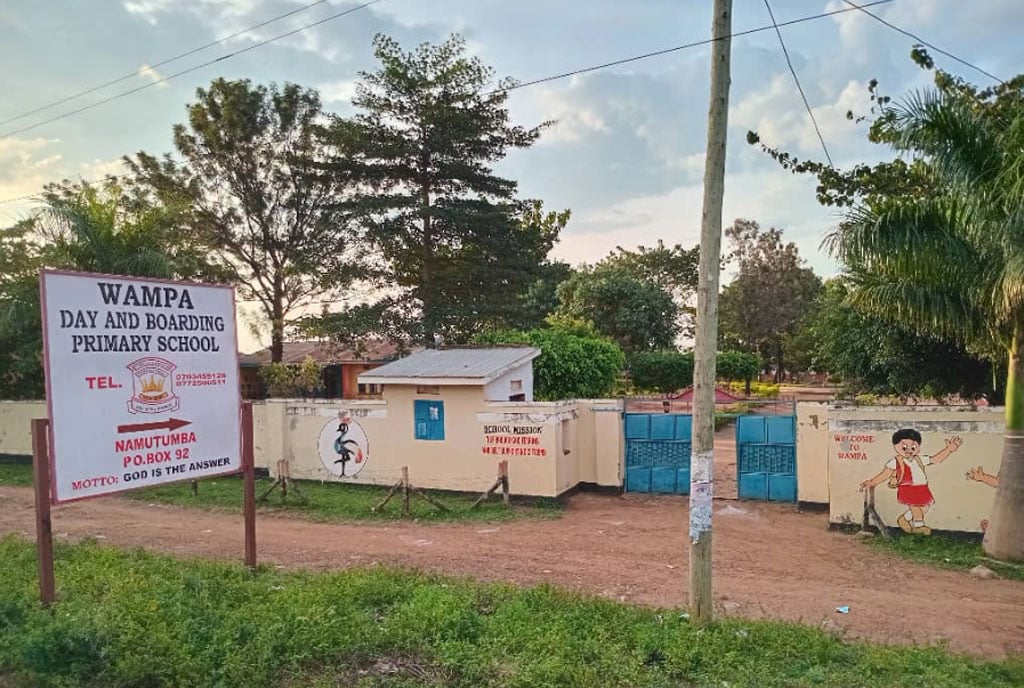Prime
Medics raise the red flag as pupils pack raw milk

Daily meal. Pupils carry raw milk to school in Sembabule District last week. PHOTO BY MOSES MUWULYA
What you need to know:
- Ms Janet Museveni, the Minister of Education, who has been on a nationwide tour to popularise the school feeding campaign, said government cannot shoulder this responsibility or subsidise lunch, adding that the ministry has a lot of responsibilities.
- She said parents must provide food for their school-going children lest the government start implementing the laws that punish those who cannot provide for them.
Sembabule. Isaac Ninsiima walks through bush thickets as he heads to Kabukongote Primary School in Ntuusi Sub-county, Sembabule District.
With his exercise books tucked in a polythene bag, the Primary Five pupil carries a one-litre jerrycan of raw milk for his lunch.
The 10-year-old says during his five years in school, he has been feeding on raw milk as his daily meal.
“My parents said they cannot pay for my meals at school when there is plenty of milk at home,” Ninsiima says.
Like Ninsiima, many other pupils, especially those from the pastoral families, pack raw milk for lunch.
Mr Moses Matovu, the head teacher, says much as he is aware of the practice, he is worried about the effects associated with consuming raw milk.
“The problem is that they [pupils] take it when it is raw, and some can take it when it has gone bad which seems better than spending a whole day on an empty stomach,” Mr Matovu says.
He says out of the 620 pupils at the school, 527 carry the milk.
Consumption of raw milk is a common practice by both children and adults among many cattle rearing districts of Lyantonde, Gomba, Kiruhura and Isingiro.
“It is part of their [pastoral communities] culture to consume raw milk and it might be difficult to convince them to drop the habit despite the risks associated with it,” Mr Matovu says.
According to medical experts, despite milk providing a wealth of body nutrients, the dangers of taking raw milk can pose serious health risks to children.
In Sembabule alone, statistics from the health department indicate that 1,236 cases of brucellosis have been recorded between July 2017 and April this year.
Brucellosis causes on and off fever, body pain and sometimes swollen testes. It shares symptoms with other diseases which usually makes it difficult to detect.
Illnesses
Dr Robert Migade, a doctor at Villa Maria Hospital in Kalungu District, says raw milk can cause illness, including vomiting, diarrhoea and abdominal pain.
“Since milk is nutritious, even bacteria love to feed on it. So, unboiled milk can cause a running stomach and a pupil cannot concentrate when the teacher is teaching,” Dr Migade says.
He also warns that people taking unboiled milk have higher chances of contracting diseases such as tuberculosis.
“If any person drinks raw milk they are likely to contract bacterial diseases such as brucellosis which can keep them at home for longer period of time since the fever takes long to get healed and it can even reoccur,” Dr Migadde says.
Mr John Kafeero, a veterinary doctor, says although livestock diseases such as anthrax and East Coast fever may not affect human beings, Foot- and -Mouth disease (FMD) pose a serious threat.
Mr Kafeero says a person who consumes milk from an animal which is already infected can develop mouth sores.
“During outbreak of FMD, like it is the case in many districts, it would even be good to forego milk, whether boiled or not,” he says. To avoid the health risks, Mr Matovu says he encourages parents to contribute money or food items such as beans and maize flour to feed their children.
However, like in most primary schools under government’s Universal Primary Education, the move to provide meals hit a hard rock as parents maintained that the government told them that education is free.
For two decades now, there has been no clear feeding programme in UPE schools which has negatively impacted on the scheme, causing massive drop-outs and absenteeism.
However, following last year’s strategic review by National Planning Authority report on Uganda’s Sustainable Development Goal II, the government is now directing parents and guardians to ensure their children are fed by contributing some money or food rations.
The report showed that seven children in every 10 school-going learners do not get a meal while at school.
Section 5(2) of the Education Act (2008) stipulates that it is a responsibility of parents to feed their school-going children.
Feeding drive
Ms Janet Museveni, the Minister of Education, who has been on a nationwide tour to popularise the school feeding campaign, said government cannot shoulder this responsibility or subsidise lunch, adding that the ministry has a lot of responsibilities.
She said parents must provide food for their school-going children lest the government start implementing the laws that punish those who cannot provide for them.
On average, Shs100 billion is earmarked for basic education annually and a big portion goes to paying teachers’ salaries and infrastructure. In 2016 /17 and 2017/118 fiscal years, the sector enjoyed the biggest share of the national cake with an allocation of Shs2.4 trillion and Shs2.5 trillion, respectively.



